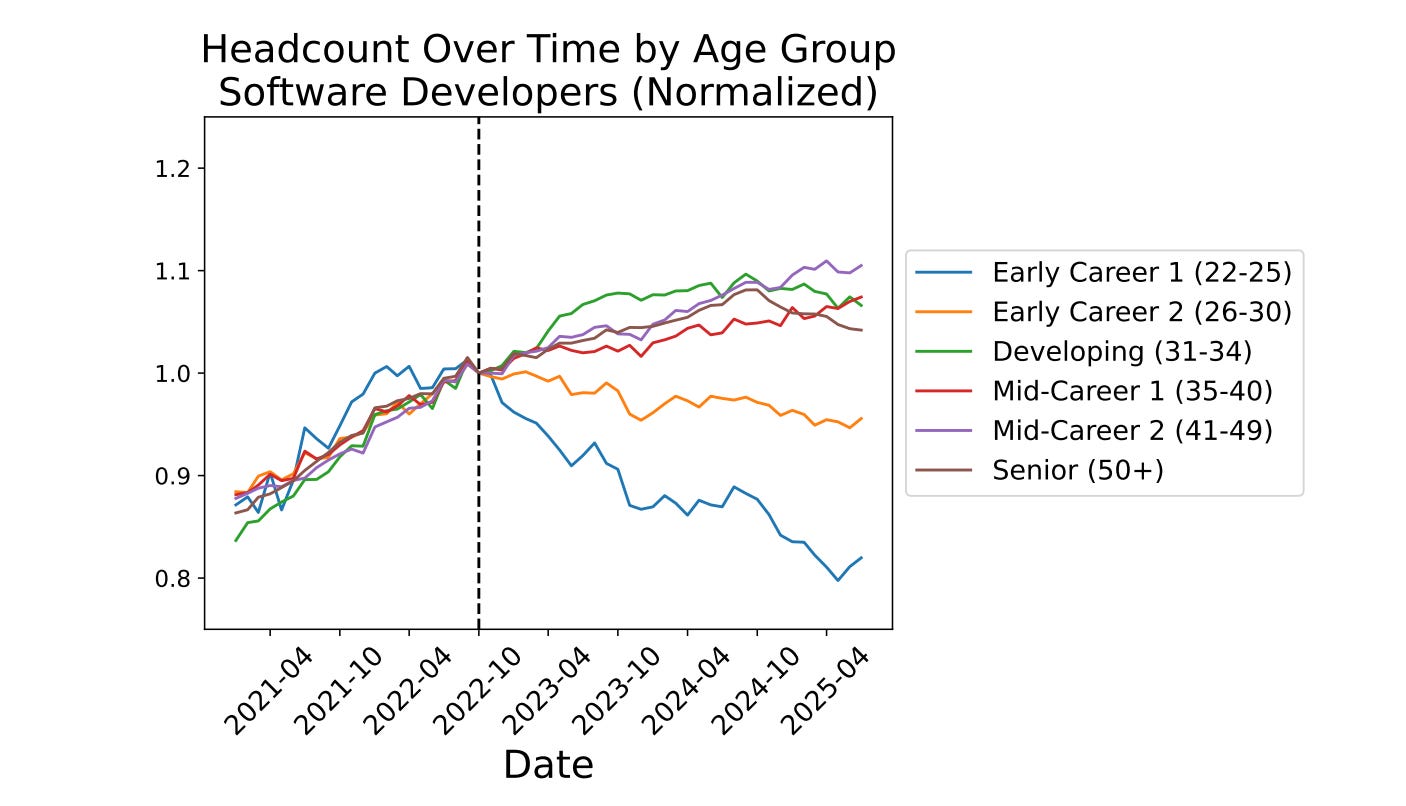New Stanford research asks: Is Gen Z cooked?
Not quite, but they are caught in the middle. Not enough deep experience like Millennials / Gen X. Not AI-native like Gen Alpha. What should they do?
Gen Z is getting squished in the middle.
According to recent Stanford research, employment for entry-level workers (aged 22 to 25) in industries with high-exposure to AI dropped sharply from 2022 to 2025, even as older workers kept their jobs.
Software developers under 25 saw nearly 20% declines. Similar for customer service.
Cue the conventional advice: Gen Z, hang in there. Find opportunity in chaos. Make your own gold rush.
That's wishful thinking. This is the reality: Gen Z graduated directly into the ChatGPT era.
Right now, they have neither the deep experience and networks that Millennials and Gen-Xers have built over the years. Nor will they have the advantage of growing up truly AI-native like Gen Alpha will. They’ve spent 4 years learning to code just as coding became something AI does better.
Mistimed. Like ad men who perfected print right before digital ads took over the world. Or darkroom technicians who perfected film development right before digital cameras.
The math is brutal. If AI makes knowledge workers 10x more productive, we need 10x more demand to maintain employment status quo.
In an optimistic view, demand might grow 10x, 20x, 30x, maybe in the next decade. But right now, we may be discovering that the economy needs 30% fewer knowledge workers total.
It’s not all doom. I believe there is a silver lining. The data does suggest that while employment declined where AI automates work, it grew in areas where it was used to augment human work.
Gen Z might be uniquely positioned for this. They understand AI's capabilities better than older workers but are not yet calcified into pre-AI work patterns..
Like, pivot from "I write code" to "I direct AI systems that write code”. Or from “I edit videos” to “I direct a collective of human and AI agents to create narratives”.
They could become the generation that defines human-AI collaboration, only because they have no choice.
Like millennials who’ve had to reinvent themselves several times…when the old ladder's been pulled up, you learn to climb differently. The question is whether this is enough when the competition is both machines below and experience above.
The Download
News That Mattered This Week
OpenAI's IPO launch likely faces delays until 2026 due to Microsoft negotiations – report: One of the key issues pertains to Microsoft's access to OpenAI's intellectual property. Another area of debate is the artificial general intelligence, or AGI, clause. The clause allows OpenAI to limit Microsoft's IP access once it achieves AGI, which is when an AI system possesses human-like and beyond cognitive abilities. According to the report, Microsoft CEO Satya Nadella wants to scrap this clause.
Nvidia stock fell 3.2% Wednesday after reporting record sales, falling short on data-center revenue, and predicting cooler growth: Nvidia reported another quarter of sustained sales growth in its earnings statement, with $46.7 billion in revenue, a 56% increase compared to the same period last year.
Google Deepmind’s '“Nano Banana” image model tops charts hours after release. I ran a series of experiments and was impressed by the consistency in chararcter and details.
Meta partners with Midjourney on AI image and video models: Meta’s research teams will collaborate with Midjourney to bring its technology into future AI models and products. The Midjourney partnership could help Meta develop products that compete with industry-leading AI image and video models, such as OpenAI’s Sora, Black Forest Lab’s Flux, and Google’s Veo.



